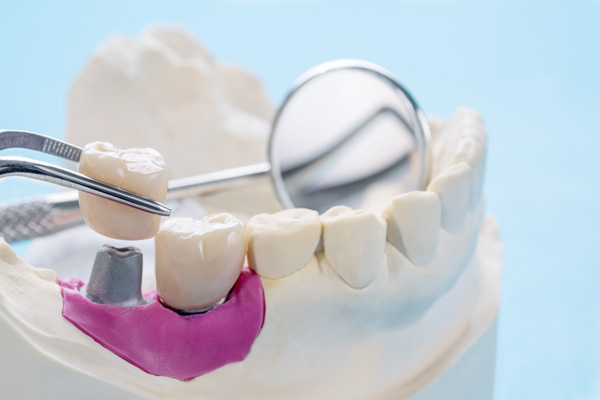A Dental Crown for a Broken Tooth

Patients who have damaged teeth might want to consider getting a dental crown. One of the benefits of a dental crown is that it can protect the tooth and prevent extraction from being necessary. There are many kinds of materials, such as metal or porcelain crowns. Patients can also look for more natural options, which will not look out of place in the mouth. The dentist will help you find the right crown to repair your broken tooth.
Getting a crown
If the tooth has become damaged, a patient might find the tooth has become weak or worn out. The process to get the crown depends on whether the patient receives a multi-day or same-day procedure. But when done traditionally, the patient will need two dental visits. The dentist starts by preparing the damaged tooth. This process involves filing down the tooth and doing X-rays.
The tooth has to get filed down so it can receive the crown better. After preparation, the dentist takes an impression of the area so that the new crown will fit correctly. The patient might receive a temporary crown. Since it will not fit and the finished one will, patients will need to take care not to damage the area.
It could take a couple of weeks for the lab to create the permanent dental crown. But after finishing it, the patient can receive the dental crown on the tooth. If the patient has a same-day procedure, it will be a little different. The patient gets a digital model made of the teeth.
The dentist uses the scan to create a crown using software on the computer. Then the patient only has to wait a few hours for the procedure. The crown is then ready to place. Of course, not every dentist has that technology, so patients will want to ask ahead of time.
Once the dental crown is placed
After getting a dental crown, the patient needs to care for it right. Then it can last many years to come. To prevent the area from decaying, the patient will need to brush the teeth a lot. The patient will want to brush twice each day or more often. The patient may wish to use toothpaste for more sensitive teeth.
The area near the crown could feel sensitive to heat or cold. And flossing is another way of keeping the teeth in great condition. Patients might want to avoid having tough foods since those might cause cracking. Porcelain is even more likely to crack. The dentist might choose to provide the patient with a nightguard to stop the crown from breaking from grinding.
Pick the right dental crown today
If your teeth are broken or damaged, you might choose to get a dental crown to repair the problem. These protect the tooth, allowing you to keep it. That way, you do not need an extraction. If you want to know more, the first step is to make an appointment.
Request an appointment here: https://balmoraldentalcenter.com or call Balmoral Dental Center at (256) 429-3870 for an appointment in our Huntsville office.
Check out what others are saying about our dental services on Yelp: Dental Crowns and Dental Bridges in Huntsville, AL.
Related Posts
A damaged dental crown can cause discomfort and disrupt the functionality of your teeth. Whether the crown has cracked, chipped, or fallen out, addressing the issue promptly is crucial for preserving your oral health. Dental crowns are designed to protect and restore damaged teeth, but taking the right steps can prevent further complications when they…
A dental crown is a cap used to completely cover back moral teeth. The process of having a crown placed is quite simple, but there are a few key preparation steps that a dentist must take first.Outlined here are the steps that a dentist takes to prepare a tooth for a dental crown. Review this…
When a tooth needs to be restored, a dental crown is usually a great option. Restoring a tooth to good form involves the preparation of the tooth for the placement of the crown. Getting a crown is usually recommended because it can help restore your tooth to its normal shape, function, and look. Read on…
When getting a dental crown, you might wonder how many visits you need to make before you can get the restoration. Usually, you can expect to have around two office visits to complete the process. There are several steps involved, so you might want to understand each one a bit better. Keep reading to learn…


